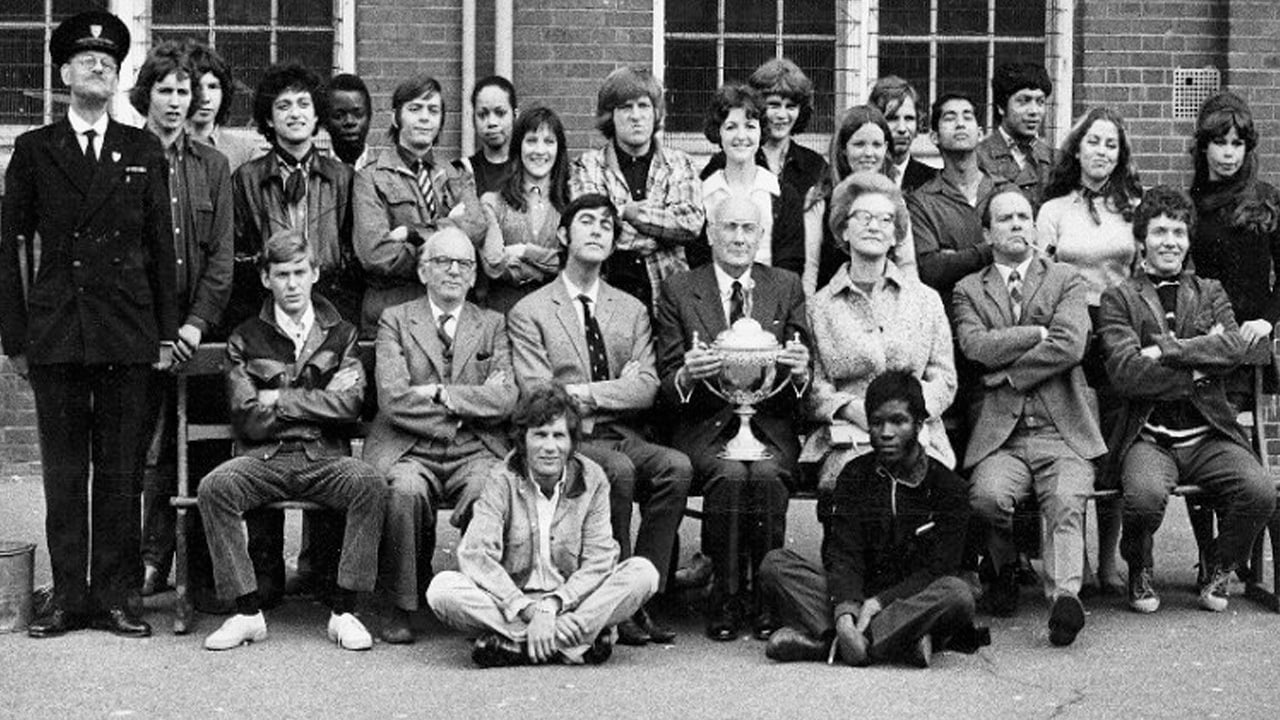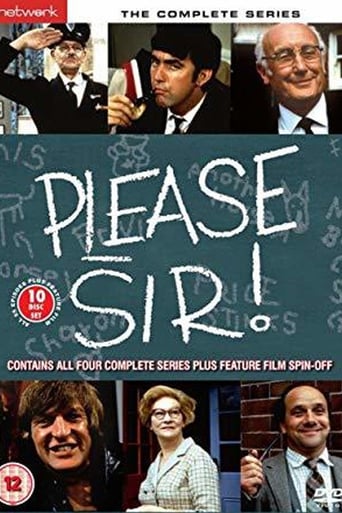Breakinger
A Brilliant Conflict
Peereddi
I was totally surprised at how great this film.You could feel your paranoia rise as the film went on and as you gradually learned the details of the real situation.
Ketrivie
It isn't all that great, actually. Really cheesy and very predicable of how certain scenes are gonna turn play out. However, I guess that's the charm of it all, because I would consider this one of my guilty pleasures.
Marva-nova
Amazing worth wacthing. So good. Biased but well made with many good points.
bettsfamily1
As an exemplar of ensemble sitcom Please,Sir! would be very hard to beat. The first two series certainly contained both scripts and performances that would put much else to shame.Anyone who has been through the English state school system in the last 50 years would recognise most of the character types and this realism certainly added to the charm. John Alderton was well cast as the young idealist but arguably overshadowed by the simply peerless Joan Sanderson as frosty deputy head Miss Ewell and the great Derek Guyler as the war obsessed caretaker,and every school that I ever attended had a miserable physics teacher , pens in breast pocket, who openly hated teaching as presented here by Richard Price. The pupils were an almost equally solid troupe- although quite visibly 10 years too old for the roles - and over all it just worked superbly well. Sadly , like most sitcoms, it outstayed it's welcome and by the final series was almost unrecognisable with a changed cast and weaker, sometimes repeating, scripts but for the first two series this was as good as it got and even stands up well to nostalgic viewing nearly fifty years later. Great stuff
crossbow0106
For the first three seasons, this show was very good. It is the story of an idealistic teacher played by John Alderton who becomes the teacher for the unruly students of class 5C. The students (some of whom looked older than their school ages) aren't bad kids, but they are from a working class background, kind of a rough upbringing. They are naturally not trusting of authority, and Alderton does a good job as the teacher that they actually, if not love, at least respect. There are other characters, like Norman (Deryck Guyler), who is the comic foil most often, the somewhat doddering Headmaster (Mr. Howlett) and the tough as nails Doris (Joan Sanderson), but the show is best when it revolves around 5C. After three seasons the kids of 5C were no longer in the series, neither was Alderton. The show went on for another season, but the momentum was lost. Not a laugh riot, it is better than most school comedies. Its more realistic than Welcome Back Kotter, which I like mostly for nostalgic reasons. I recommend this, you don't have to be British to like it. The movie of "Please Sir" is also recommended, it is fun.
all-briscoe
My positive comments above only refer to the first two series. Having now seen episodes from the final two series, I'm afraid to say that they are hugely disappointing. This is largely down to cast- changes, particularly among the pupils but also the teachers. The new characters are unimpressive, with the exception of the aggressive PE teacher Mr. Dix, played by Glynn Edwards, who shows some style.Maybe the writers were also running short of ideas by this stage, with many of the stories and scenarios becoming stale and silly. There are still occasional flashes of form, but the impression has to be that the show should have quit with its stock high after the first two fine series. These are still worth checking-out.
alanbriscoe
Normally the words "ITV sit-com" are enough to strike fear into viewers. However in the past ITV did produce some good comedies and this is one of them. It is not a great one but it was very entertaining and deserves more recognition.It is one of very few sit-coms to have been set in a school. Like all sit-coms though, the situation isn't that important - the humour comes from the characters and their relationships, although the school setting provides a nice variation from the usual domestic comedies. It follows the travails of a group of extremely mature-looking fifth-formers and their hard-pressed teachers.The pupils are a motley bunch: the dominant Eric Duffy; tarty Sharon; slow-witted but endearing Dennis; cocky Peter Craven; god-fearing Maureen who has a crush on the teacher; and fantasist Frankie Abbott. They are the nucleus of the "class from Hell" 5C - most of whom silently sit in the background. However they all have hearts of gold and their behaviour is surprisingly good - certainly comparing well to what many real students and teachers experience. They are lovable rogues. All work well from a comic viewpoint with the exception, I feel, of Dennis where the humour seems to rest almost entirely on his stupidity. All the actors are clearly well beyond school age, and could easily have been playing teachers!Much of the success of the series lies with the staff characters. John Alderton played the central character of Bernard Hedges, teacher of 5C. While apparently mild-mannered, he actually has few problems managing his class and has a good relationship with them. However his indecisiveness and determination to stick up for his pupils often leads him into humorous scrapes.He has often fractious relationships with the Head Mr. Cromwell (Noel Howlett) and Deputy Doris Ewell (Joan Sanderson). These are tremendous characters and splendidly played. The Head is quite out-of-touch, a misguided liberal, pretentious but capable of engaging in quite juvenile behaviour. Miss Yuell is a haughty disciplinarian whose harsh exterior only relents in the presence of the Head, with whom she is infatuated. Joan Sanderson often played such roles, and always to perfection.
Price (Richard Davies) is another superb figure - a cynical, sarcastic professional Welshman with little affection for teaching but great affection for beer. Again a great acting performance. Finally there is the doddering, ancient Mr. Smith, devoted to his wife and again capable of some very juvenile behaviour, usually in his conflicts with the Head. The interplay between all these is very funny.However for many viewers the favourite staff member was Mr. Potter, the caretaker (Deryck Guyler). Potter was an ex-soldier, obsessed with the war, with ideas above his station. He as constantly at odds with everyone in the school except the Head. He received his deserved come-uppance regularly in the series.Obviously the show is of its time, and not just in the fashions such as the remarkably short skirts. Some of the humour might be seen as very innocent in today's more cynical age. The language used was quite strong for its time, but still acceptable to a family audience. It would seem very tame by today's standards. There are some occasions when the show borders on the politically incorrect. However the show stands up much better than many others from that period and the 1970s. For example in one episode an Indian student joins the class. Typically for the time he is played by a white actor and wears stereotypical Indian dress. However he is shown to be intelligent, polite and articulate, with committed parents. His classmates avoid the prejudice of their parents. Liberal ideas generally are given a sympathetic airing, particularly by Hedges. They are though less effectively expressed by the bumbling Head. "I would rather resign than be forceful," is one example.The show avoided becoming a one-joke, innuendo-laden affair unlike many others. The humour chiefly comes from defective people, defective relationships and defective situations, as most comedy does. The show still lives on, in video format and also on satellite channels. It is well-worth checking out, whether you remember it originally or, like me, are of a younger but curious generation. I feel you will be pleasantly surprised, and satisfactorily entertained.

